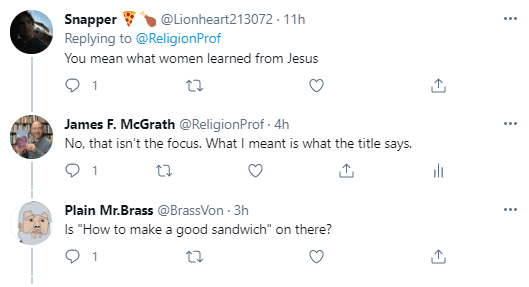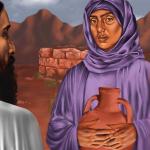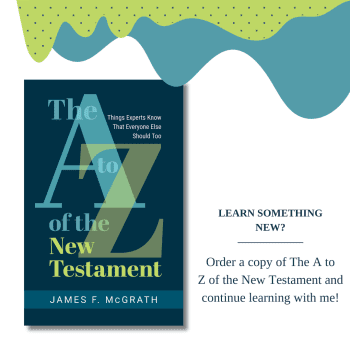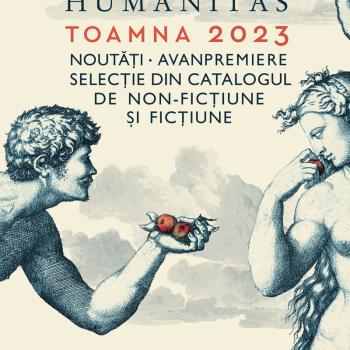Andy Cassler is continuing his blogging through my book, having added a second post about the introduction. Knowing Andy’s views, I was expecting him to approach the book with significant reservations and to not be persuaded by many things I wrote. Nonetheless I am somewhat disappointed that he leads this blog post by focusing on what I don’t mention rather than what I do. He points out that those to whom Jesus asked questions when learning in the Temple were also amazed by his answers. Since no Christians, to my knowledge, think Jesus’ teaching is anything other than impressive, I did not think this point needed to be emphasized. What some and perhaps most Christians miss is the part where it emphasizes that Jesus learned. Even when the New Testament says that people were amazed at Jesus’ teaching or his healings, they ask questions like whether he could be the son of David (Matthew 12:23), and comment on the incredible authority that God has given to human beings (Matthew 9:8). Neither of those is from Luke, which emphasizes Jesus learning and that the works he performed were due to his being empowered by God’s Spirit. In short, Christians have historically allowed the impressiveness of what Jesus is depicted as doing as a human being full of divine wisdom and power to overshadow the fact that the earliest sources view him as a human being in whom God is at work in these impressive ways. If one wishes to formulate a doctrine about Jesus that goes beyond what the earliest sources say about him, that is understandable. If one wishes to turn around and appeal to that doctrine to negate what it says about Jesus learning, then I must object, and that is one reason why I wrote the book.
Andy also appeals to the doctrine of the “sufficiency of scripture” to say that if it leaves out the names of and stories about women more frequently than in the case of men, we must be satisfied, even though this is a characteristic of other literature of that time and place.
And, because, he says, the “ancient authors [of the Gospels] themselves often silenced women” (9), McGrath seems to similarly reject the sufficiency of Scripture since in “[denying] ancient women the chance to be heard” the unfortunate result is that the “ancient male authors did not provide us with the information we need to fully hear them” (10). McGrath explains that the way the authors silenced women was by “not naming them or including speech by them as often as they do for men” (9). While not trying to demean women or downplay the helpfulness of such information, one wonders what “fully hearing” them does to aid the purposes of the authors or of Scripture? When discussing the sufficiency of Scripture, the ESV Study Bible contributors write, “believers should be satisfied with what Scripture teaches and what it leaves unsaid” (2508).
I disagree strongly. One could easily say that developing a view of the cosmos that goes beyond and differs from that assumed by the Bible’s authors, once again representing something they simply assumed and shared with their contemporaries, we should be satisfied. Unless one wishes to reject Copernicus and Pasteur and countless others who have found some information provided by scripture to be insufficient, then once again we should resist this attempt to use a doctrine about the Bible in an effort to force the Bible to be something it is not, and to compel us to accept it as something other than what it is. (Compare Andy’s treatment of the sufficiency of scripture with Brent Niedergall’s more nuanced discussion of its clarity.)
I hope you’ll read the rest of this entry to his review and, especially if you have read the book (even if only the introduction thus far), will add your thoughts to the discussion, whether there or here (or both).
This exchange on Twitter illustrates another reason why my book needed to be written:

Ian Paul mentioned some widespread but problematic assumptions about the Samaritan woman
Libby Schrader recorded a podcast about Mary and Martha:
There’s an article on the Progressive Christianity website about Mary Magdalene, drawing on Meggan Watterson’s book
Amy-Jill Levine, who provided incredibly helpful feedback on my manuscript prior to publication, here has a conversation about Jesus with Gabriele Boccaccini:
The Apocryphal Acts of Paul and Thecla and Their Impact
There is a review of Biblical Women and the Arts in TC
New book: The Oxford Handbook of Feminist Approaches to the Hebrew Bible
Roman epitaphs to and for wives
John Squires is blogging through the Gospel of Mark:
2 Mark: collector of stories, author of the passion narrative
3 Mark: placing suffering and death at the heart of the Gospel












